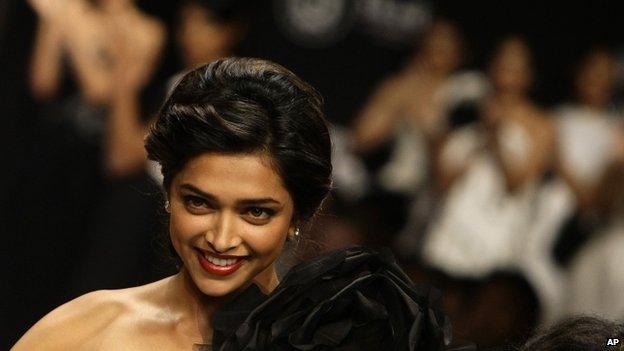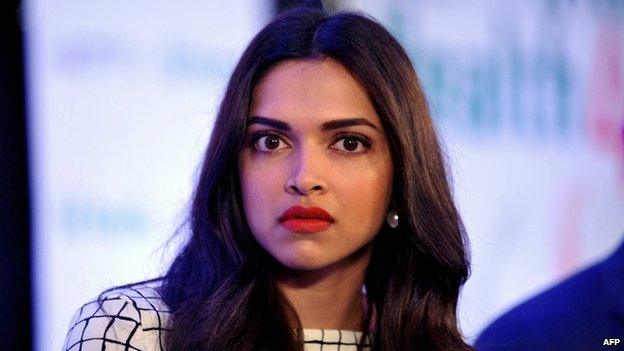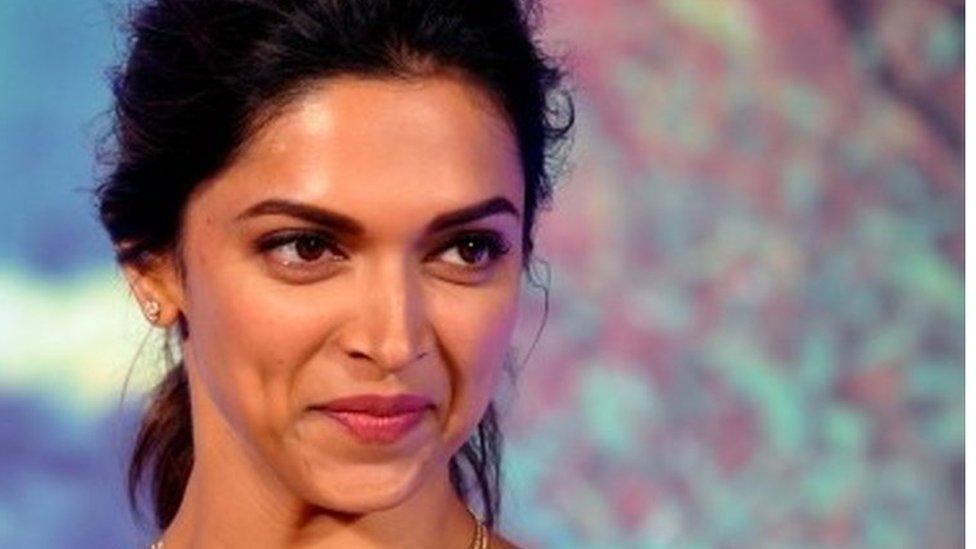Bollywood cleavage row shows India's 'crass' side
- Published

Deepika Padukone is one of Bollywood's top actresses
A clash between India's top newspaper and a Bollywood actress shows no signs of abating.
It all began last week with The Times of India publishing a photo and tweet about actress Deepika Padukone's cleavage.
"OMG: Deepika Padukone's cleavage show," the paper tweeted alongside a photo of her from an event last year.
The actress hit back angrily, tweeting: " YES! I am a Woman. I have breasts AND a cleavage! You got a problem!!??".
It was re-tweeted more than 7,000 times and the #IStandWithDeepikaPadukone became India's top Twitter trend for hours on the day.
The newspaper deleted the tweet, but tried to mollify her, replying "It's a compliment! You look so great that we want to make sure everyone knew! :)"
Clearly, Padukone was not pleased with the reply. Neither were many others.
She wrote a longish post on her Facebook, external on Friday, saying that she had "spoken out against an ideology that such regressive tactics are still being employed to draw a reader's attention at a time when we are striving for women's equality and empowerment".
"I have no issue celebrating my body and I have never shied away from anything on-screen to portray a character… All I am asking for is respect as a woman off-screen," she wrote.
The Times of India has now hit back , externalwith a piece which has whipped up more social media outrage, with many accusing the paper of being "as distasteful as its tweet"., external
The newspaper accuses Padukone of being hypocritical about the picture, saying several "media outlets have freely displayed Deepika's cleavage even as they sounded all outraged on her behalf".
'Sexist coverage'
The paper admitted that the "headline could have been better".
"But the world of online is different from that of newspapers. It is chaotic and cluttered - and sensational headlines are far from uncommon".

Deepika Padukone has been praised for speaking out against sexism
The newspaper also blamed Padukone for trying to support censorship and gaining "greater publicity" for herself ahead of a film release.
"…does she now want us to first check with her as to which pictures of her - taken at public events - we can or cannot publish? Are we going to have a parallel censor board for pictures of film stars taken off screen but in plain sight of the world, as Deepika's was?"
Many took issue with the newspaper's argument.
Journalist Kanika Gahlaut tweeted , external: "If deepika padukone has the right to wear what she likes we have the right to humiliate her for it?"
Gahlaut wrote that Padukone had shown "guts" to "stand up to Times of India's sexist coverage", but also hoped that she would stay away from doing adverts which objectify women.
Others like Shivam Vij of scroll.in , external are categorical in saying that the row has "highlighted the need for everyone, including Bollywood itself, to ask some tough questions about the objectification of women".
The controversy, tweeted journalist Hindol Sengupta, external, holds up a "mirror to us".
"The Deepika Padukone Vs The Times of India is a mirror for us. This is the distasteful, unapologetically crass society we have created," he tweeted.
"It is worth asking if we want to live in a country, have our children live in a country where a woman's cleavage is fought upon in headlines."
A rights activist in Mumbai has said he plans to file a complaint against the newspaper, external with the National Commission of Woman for "outraging the modesty of a woman by publishing and republishing her photograph with a pointer on her breasts".
Many say there are possibly two separate issues here - objectification of women in popular films and mass media and the responsibility of the media, as Vij says, of "established media brands to maintain propriety, decency and good taste".
Padukone works in a film industry which has traditionally revelled in crude sexual objectification of women, and there is very little outrage about that from within.
Filmmaker Shyam Benegal has spoken about the need for Bollywood to change the way it depicts women, external and "the effect you have on society, the desensitisation that takes place".
There is also, observers say, a perfectly symbiotic relationship between Bollywood and the media; a number of India's top film awards are sponsored by some of India's leading media groups, including the one which owns Times of India.
Social scientist Shiv Visvanathan says Padukone may be upset that the same media which has built up her image of a "young, impish, lissom, bubbly" young model-turned-actress - had "betrayed" her by portraying her as a cleavage-flashing bimbo.
"She was an embodiment of a certain kind of beauty. The image of an aesthetic woman collapsed when the Times of India put out the first tweet," Mr Visvanathan told me.
Clearly, the reciprocal - and sometimes corrosive - relationship between the mass media and film stars all over the world is double-edged, and this unsavoury episode is further proof of that.
- Published15 September 2014
